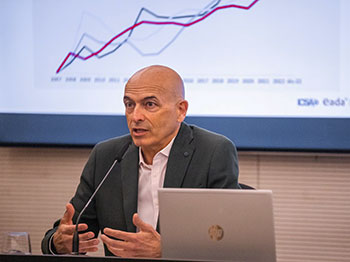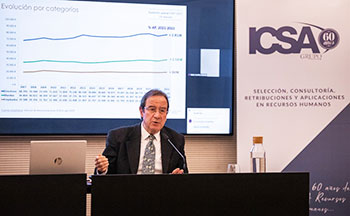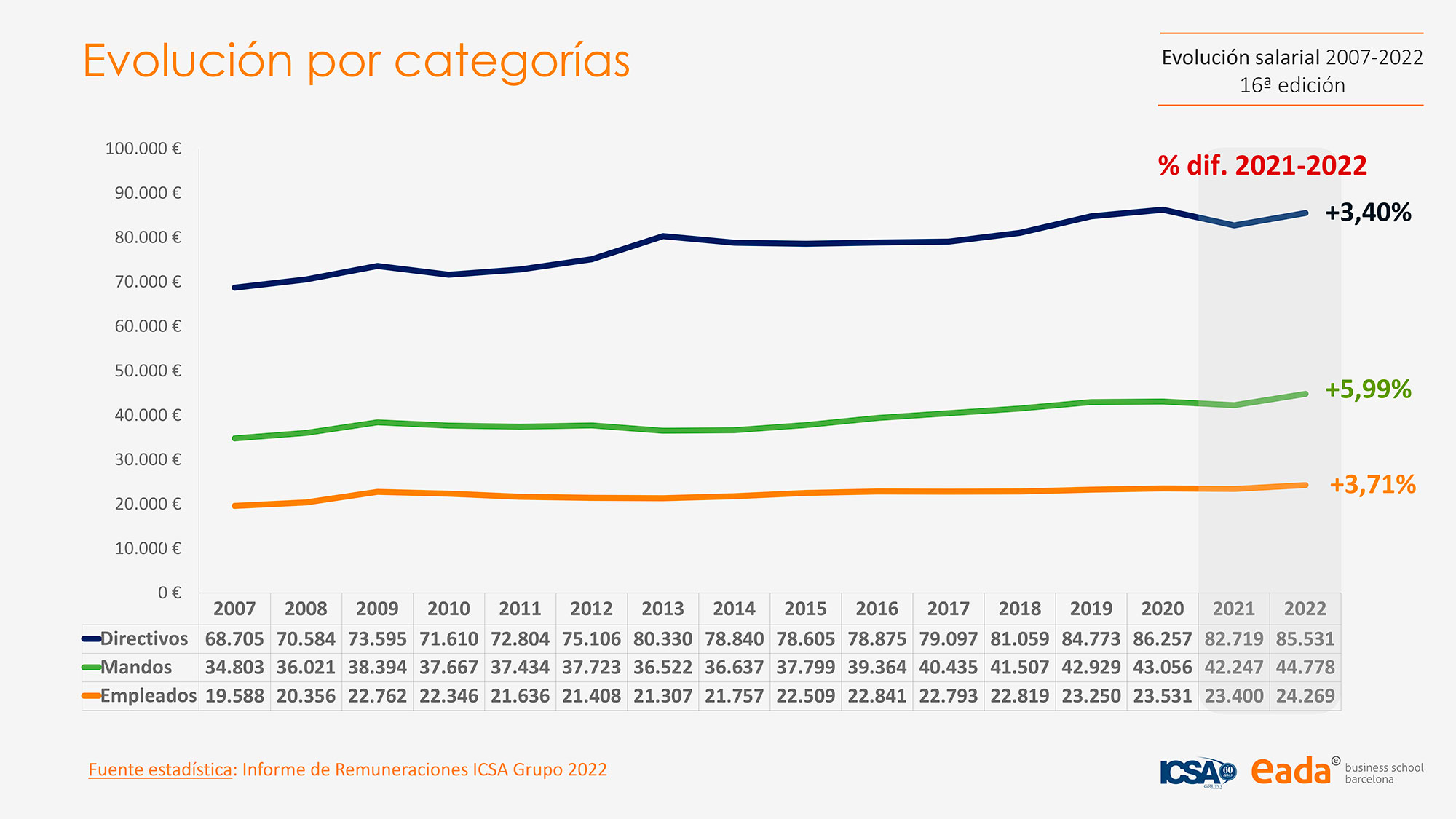16th Wage growth report 2007-2022 by EADA and ICSA Grupo
 For the first time in 15 years, salaries increased in all professional categories by more than 3%. However, these salary improvements are imperceptible due to the high accumulated inflation, which in December 2022 reached almost 33%. In fact, in the last year, the salary differences have increased considerably, according to professional category, sector and company size. This is one of the conclusions revealed in the 16th Wage growth report 2007-2022 by EADA and ICSA Grupo. According to this report, those who have had the highest remuneration have been the middle managers, with an annual increase of 5.99% -at the same level as the current CPI-, going from 42,247 euros in 2021 to 44,778 (2,500 more euros). This is followed by employees, who have had an annual increase of 3.71%, going from 23,400 euros to 24,269 (about 870 euros more) and, finally, managers, with an increase of 3.40%, going from the 82,719 euros to the 85,531 euros at present (2,812 euros more).
For the first time in 15 years, salaries increased in all professional categories by more than 3%. However, these salary improvements are imperceptible due to the high accumulated inflation, which in December 2022 reached almost 33%. In fact, in the last year, the salary differences have increased considerably, according to professional category, sector and company size. This is one of the conclusions revealed in the 16th Wage growth report 2007-2022 by EADA and ICSA Grupo. According to this report, those who have had the highest remuneration have been the middle managers, with an annual increase of 5.99% -at the same level as the current CPI-, going from 42,247 euros in 2021 to 44,778 (2,500 more euros). This is followed by employees, who have had an annual increase of 3.71%, going from 23,400 euros to 24,269 (about 870 euros more) and, finally, managers, with an increase of 3.40%, going from the 82,719 euros to the 85,531 euros at present (2,812 euros more).
Revaluation of intermediate positions
According to Dr. Jordi Assens, Professor of EADA's Strategy, Leadership and People Area, "the revaluation of intermediate positions corresponds to a greater demand for these professionals in companies, especially SMEs and large companies". In his opinion, "they were the most affected during the most critical stage of the 2008 financial crisis, that is, between 2010 and 2015, because many organizations eliminated or substituted intermediate profiles with positions of responsibility as a measure of cost savings and, in addition , had a decrease in salary (going, for example, from an average annual salary of 36,021 euros in 2008 to 36,637 euros in 2014)". Ernesto Poveda, President of ICSA Grupo, adds that "the current economic situation has highlighted the need for companies to have more heads of technical areas that provide knowledge and added value to business development and that contribute to increasing productivity”.
Remuneration by sectors
By sectors, the one with the highest remunerations is again banking and insurance: 92,980 euros in managers, 53,129 euros in middle managers and 28,489 in employees. According to Poveda, "this is due to the reorganization that carried out in this sector in recent years, which has been accentuated with the recent mergers and takeovers." The novelty is given by the salary increase in the industry in all professional positions, especially in managerial positions, which in the last two years have had an improvement of more than 5,000 euros, reaching the current 88,340 euros. "This is good news for our economy due, above all, to its internationalization and the increase in exports," says Poveda. But the revaluation in the transport sector also stands out, which has especially benefited middle managers (who in the last two years have increased their salary by around 2,000 euros, reaching 45,306 euros in 2022) and employees (28,489 euros in the present). According to the president of ICSA, "logistics has had a rebound during the pandemic and has emerged as one of the key sectors." On the contrary, commerce and tourism, two of the sectors most affected by the pandemic, continue to register the lowest remuneration in all categories.
Differences according to type of company and Autonomous Communities
 By type of company, there are significant changes. In SMEs, the profiles with the highest salary increases have been managerial positions (+6.21% in small companies, reaching 68,891 euros- and +5.02%, in medium-sized companies, with an average salary of 93,532 euros-). and intermediate managers (+6.94% in small companies, reaching 38,937 euros, and +5.30% in medium-sized companies, being 47,376 euros). On the other hand, the largest salary increases for employees have occurred in large companies, exceeding 6% and reaching an average annual salary of 27,504 euros. This is due, according to the authors of the study, to union pressure and the negotiations that the workers' committees have carried out in these organizations.
By type of company, there are significant changes. In SMEs, the profiles with the highest salary increases have been managerial positions (+6.21% in small companies, reaching 68,891 euros- and +5.02%, in medium-sized companies, with an average salary of 93,532 euros-). and intermediate managers (+6.94% in small companies, reaching 38,937 euros, and +5.30% in medium-sized companies, being 47,376 euros). On the other hand, the largest salary increases for employees have occurred in large companies, exceeding 6% and reaching an average annual salary of 27,504 euros. This is due, according to the authors of the study, to union pressure and the negotiations that the workers' committees have carried out in these organizations.
By Autonomous Communities, Madrid leads the best salaries in all categories. In the case of managers, Madrid leads salaries with an average salary of 90,740 euros, followed by Catalonia (87,455 euros) and Asturias (84,283 euros). These three same communities and in the same order are the ones that lead the remuneration of middle managers (in Madrid we would speak of 47,505 euros, in Catalonia of 45,785 euros and in Asturias of 44,125 euros). In the case of employees, salaries are much lower. Madrid once again leads the table with 25,747 euros, followed by Catalonia with 24,815 euros and, in third place, Navarra, with 24,627. According to the authors, "many innovative companies have been established in Catalonia that will attract investment in the short term, but the results are not yet visible."
Keys to reverse the current trend
To reverse this situation, the authors of the study propose several solutions. One of them is moving towards a flexible remuneration model that is adapted to current circumstances and the needs of professionals. According to Ernesto Poveda, "it is counterproductive that wages continue to be indexed to the CPI (Consumer Price Index)." In his opinion, "it is a variable to take into account but not the only one, since it is necessary to incorporate concepts such as conciliation, greater flexibility or teleworking, new forms of compensation that are better aligned with the sustainability of the organization and retention of talent." For his part, Jordi Assens focuses on "greater productivity and efficiency of companies through qualified talent and innovation". He gives the example of the impact that Artificial Intelligence is having in increasing the productivity of companies. In addition, it proposes other measures such as: "Eliminate oligopolies that generate inflation (as has happened in the energy sector), promote public-private alliances and support the growth of SMEs and start-ups that will be the unicorns of the future, link the productivity of the company to a greater distribution of benefits among the workers, or to make a better use of the European funds”.

